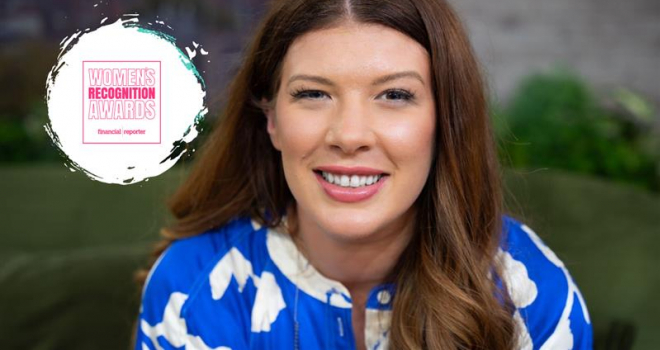
"Instead of positioning Life Insurance as though it were a vitamin, which is nice to have, position it as a painkiller."
Take back control of your money.
That’s the first thing you’ll see when visiting Financielle’s website.
You may think you’ve been sold this dream before, but very rarely has it appeared in pastel pink above a photo of a young woman sticking her tongue out while holding scissors to a credit card.
Financielle was co-founded by BBC Morning Live finance expert Laura Pomfret (pictured) and community fintech entrepreneur & partnerships expert Holly Holland to help customers “ditch debt, build savings, and be financially well.”
Since its humble beginnings as an Instagram page, the platform has grown significantly. Financielle now has over 200k members in its global community, looking to learn more about budgeting, investing, mortgages, and protection.
Laura explained that “Financielle was a personal project, it was never meant to be a business. It was an online community, but we started to spot patterns specifically around women facing so many gaps – whether it’s the pay gap, pension gap, or the insurance gap.
“We went on a bit of a journey, realising that all these things stack up. In general, women are overwhelmed with a number of different things that they have to handle on a day-to-day basis, with one arm effectively tied behind their backs.
“I think that supercharged our mission to be female-focused. The aim of Financielle isn’t to ‘dumb things down’, but simply to make financial advice ‘relatable’ and ‘less overwhelming’,” said Holly.
“There’s a financial literacy gap,” Laura continued, “women have been left out of the conversation for a very long time, because they typically didn’t have a salary to protect as such. Their unpaid labour around the home wasn’t valued.”
“When we speak to women, we get the vibe that there’s just too much all at once. It’s literally the motherload.”
Earlier this year, Financielle partnered with LifeSearch; “We offer good content, tools, and the community. But the product is the glaringly obvious missing piece to the puzzle.”
READ MORE: LifeSearch announce latest strategic partnership with Financielle
Debbie Kennedy, CEO of LifeSearch, said the brokerage was founded to make advice accessible by “giving customers great advice over the phone.”
“Back in the day, it was almost revolutionary. It hadn’t been done before. Then, as it grew, it became about how we can reach more customers and start conversations about protecting what matters most to them,” she explained.
“There are assumptions made about what’s important to women, and those assumptions are often very misguided.”
Having worked in Financial Services for over three decades, Debbie spoke about some of the “processes and policies” that haven’t supported women’s financial resilience in the past: “It was always assumed that for a joint policy, life number one was the man and life number two was the woman. It’s certainly improved, but there’s so much more we can do.”
“What we’ve always tried to do at LifeSearch is ask our customers ‘what brought you here today?’ and for some women, it’s so difficult,” Debbie added, “because they’re earning, but they’re often the primary caregiver for children, and a lot of them are now becoming caregivers for elderly parents too. That conversation can be quite nuanced and complex.”
“The way money is spoken about is still very much directed at men.”
Laura said that the lack of financial advice platforms for women inspired Financielle’s “very pink” branding. “Even something as simple as using feminine colours makes it more accessible, appealing, and obvious. We’re all different, and it’s not for everyone, but it’s clear that it’s feminine in a world where finance is very blue.”
Its partnership with LifeSearch will help tackle the protection gap by ensuring advisers “show up to conversations” in today’s market, where Life Insurance is often deemed irrelevant.
“I think that as an industry, we have been reliant on mortgage advisers saying, ‘Oh well, maybe you need to think about Life Insurance as well’. What we see happening now is that even this decision about mortgages is coming much later in life; people are renting for much longer.
“There’s a danger that those traditional triggers become even less relevant. We’ve rested too long on very traditional routes of customers thinking about life cover and coming to us,” Debbie stressed.
Laura highlighted, “We have lots of members of our community who are child-free, either by choice or not. They’re single homeowners, independent from family, and their biggest fear is ill-health taking them away from life.”
“Instead of positioning Life Insurance as though it were a vitamin, which is nice to have, position it as a painkiller.”
“The industry isn’t thinking about how they can present the solution to that problem because we’re not connecting customer stories with the product. I think that’s where the industry’s got a lot of opportunity, instead of praying customers still turn up for mortgages,” she concluded.
At the Women’s Recognition Awards (WRAs), we aim to recognise the firms and individuals pushing to make the mortgage, protection and specialist lending markets a better place to work for women and all underrepresented groups.
To find out more, follow the link here
